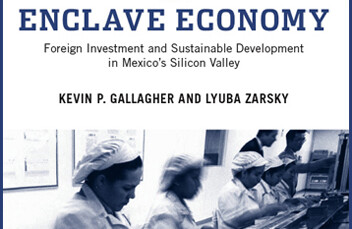Countries that negotiate trade agreements with the United States hope that such deals will attract foreign investment. The promise of investment is that—if it comes—it will translate into stable jobs, technology transfer, and economic growth. Peruvians certainly are hoping for this outcome from the U.S.–Peru Free Trade Agreement that U.S. President George W. Bush has recently sent to the U.S. Congress.
New research suggests that signing a trade agreement with the United States may not bring the desired investment and if investment comes it may not translate into economic growth.
Critics argue that the investment chapters in these trade deals restrict the ability of signatory countries to require that foreign firms adhere to performance requirements such as technology transfer and local content requirements. Traditionally, countries have instituted performance measures to spur broad economic growth by creating links between foreign firms and the domestic economy. Indeed, China has become a master of such tools over the past 15 years. Though allowed under the World Trade Organization (WTO), these development tools would be prohibited under deals with the United States.
These deals also have a little secret also not allowed under the WTO: They leave open the possibility that ad hoc investment tribunals will interpret social and environmental regulations as "indirect expropriation." Under such interpretations, multinational firms can file suit for massive compensation from foreign governments (as opposed to states filing on a firm's behalf such as in the WTO). For example, the U.S. firm Occidental Petroleum in 2004 took advantage of a U.S.–Ecuador investment treaty to challenge Ecuador's decision to cancel tax rebates and was awarded $71 million.
Proponents of these deals argue that agreeing to such measures is the price that developing countries have to pay for receiving more investment. The problem is that investment may not come and if and when it does nations will have traded away the tools that countries like China are using to make foreign investment work for economic growth and poverty alleviation.
The World Bank's 2005 Global Economic Prospects report warned that trade and investment agreements would not necessarily translate into new foreign investment. This conclusion was based on a study they commissioned for that report, which examined the experience of 20 developing countries from 1980 to 2000 to determine whether agreements that provide assurances to foreign investors did indeed attract investors.
More recent studies have similar findings for Latin America. Articles in the peer reviewed journals Latin American Research Review and the Journal of World Investment and Trade found no independent correlation between foreign trade or investment agreements and increases in foreign investment in the region.
Mexico's experience with NAFTA is an exception. At least until 2000 Mexico was able to attract unprecedented amounts of foreign investment—increasing more than fivefold and third only to Brazil and China as the largest recipients of foreign investment in the developing world.
Yet, Mexico's foreign investment has not translated into the promised benefits. Although foreign investment has surged, total investment has lagged at less than 20 percent of GDP (compared to China's 40 percent)—one of the reasons why Mexico's economy has barely grown more than one percent per year in per capita terms since NAFTA.
New research shows that although Mexico was initially successful in attracting multinational corporations, foreign investments waned in the absence of active government support and as China became increasingly competitive. Moreover, the foreign investment created an "enclave economy" the benefits of which were confined to an international sector not connected to the wider Mexican economy. In fact, foreign investment put many local electronics firms out of business and transferred only limited amounts of technology.
This evidence doesn't suggest that foreign investment or trade agreements are bad things. They suggest that the costs of lifting performance requirements and adopting draconian expropriation rules could very well outweigh the benefits of new treaties with such provisions. The experience of China suggests that investment rules should be left as they are under the WTO where they give nations the flexibility to translate foreign investment into growth.
The best trade deal for the United States is one that helps our trading partners grow their economies. Growth leads to political and macroeconomic stability and the ability to import more U.S. goods. The U.S. Congress and our trading partners should think twice about agreeing to the investment rules in pending agreements.




